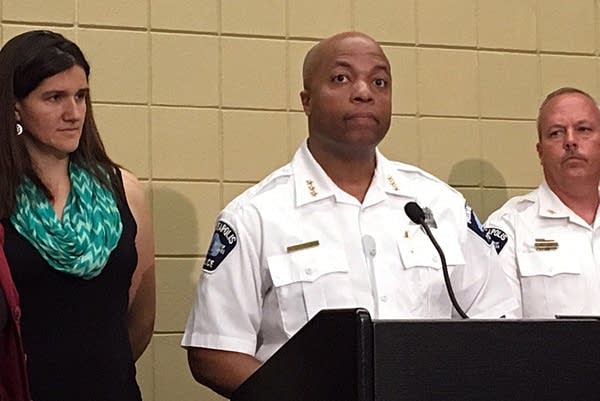New policy expands required use of body cams by Mpls. cops

Updated: 8:25 p.m. | Posted: 11:26 a.m.
Minneapolis police officers will soon be required to activate their body cameras when responding to nearly any call, under a policy announced Wednesday by Mayor Betsy Hodges and acting chief Medaria Arradondo.
The police department's use of body cameras had come under scrutiny following the recent shooting of Justine Ruszczyk, a Minneapolis resident who had called the police to report a possible rape. Neither of the two officers who responded to that call, including the officer who shot and killed Ruszczyk, had activated his body camera.
Create a More Connected Minnesota
MPR News is your trusted resource for the news you need. With your support, MPR News brings accessible, courageous journalism and authentic conversation to everyone - free of paywalls and barriers. Your gift makes a difference.
Arradondo said the new policy would take effect in three days. A system that activates body cameras when a squad car's lights are turned on will be implemented within a few months.
Hodges said the policy changes were in the works before the Ruszczyk shooting. The department's existing policy had detailed situations under which officers should activate their cameras "when safe to do so," but the new policy simply says that officers "shall activate" their cameras in those situations. It also expands its list of circumstances that merit camera activation.
The new policy says police should start their cameras, for example, upon being dispatched to a service call; before "contacting a person or exiting a squad"; before taking "any law enforcement action" or "making an investigatory contact," and "when any situation becomes adversarial." The policy lists other situations, as well, that mandate use of the cameras.
The requirement to activate cameras upon being dispatched presumably would have applied to officers Mohamed Noor, who shot Ruszczyk, and his partner, Matthew Harrity. Noor has declined to discuss the incident with investigators.
Their squad car was running without lights in the alley behind Ruszczyk's house when she was shot. She had called 911 twice to report what sounded like a rape and to check on the progress of the police response.
Police union head Bob Kroll called the changes "a knee-jerk reaction and politically motivated."
While Kroll said in a statement that the Ruszczyk shooting was tragic, he said officers were in compliance with body camera policy. Any changes to the policy, Kroll said, should be "carefully examined" before they take effect.
Andrea Brown, chair of the Police Conduct Oversight Commission, a civilian body which advises the Minneapolis department on policy matters, called the new requirements "a good first step," but may not completely alleviate concerns she and others have.
"Unless the officers are able to pick up a body cam, put it on them and have no power to turn them off, it's totally user discretion," Brown said.
The ACLU of Minnesota's interim executive director Teresa Nelson said the policy sets a default position: When in doubt, turn the camera on.
"So you had officers really saying — 'does this fit under one of these 12 or 13 discreet things? I'm not sure if it really fits this, so I'm not going to activate,'" Nelson said.
Minneapolis officials will know why and how often body cameras are being used once an audit is completed, likely in September.
Members of the city council were briefed on the audit's scope Wednesday afternoon.
Public safety committee chair Blong Yang welcomes the scrutiny.
"It's going to help us answer some questions as to where we are, what we need to do to improve," Yang said. "I think it hopefully it will move us to improve so that we can continue to build on public trust."